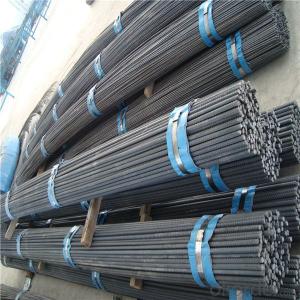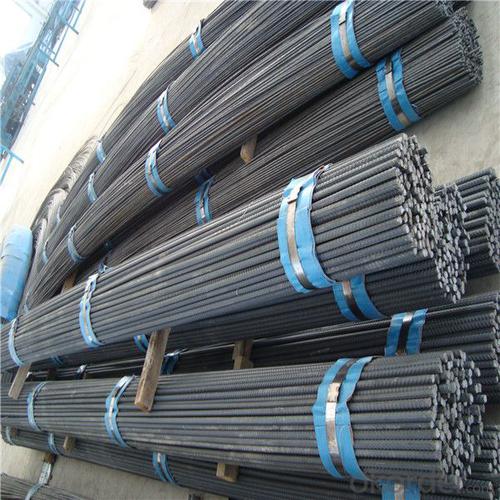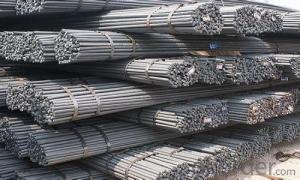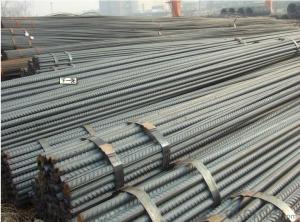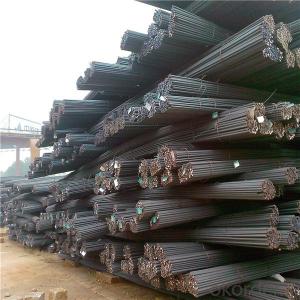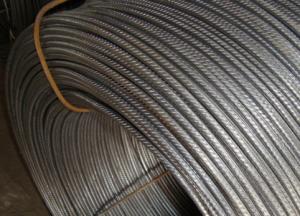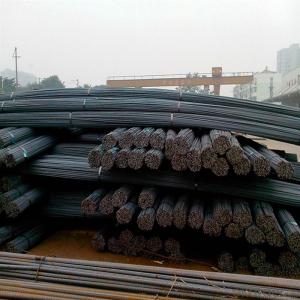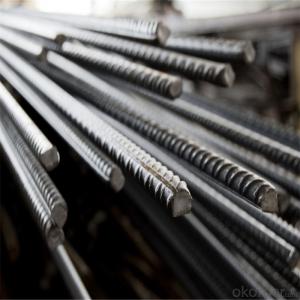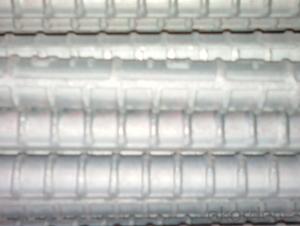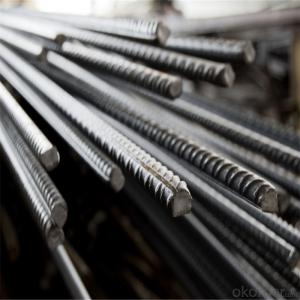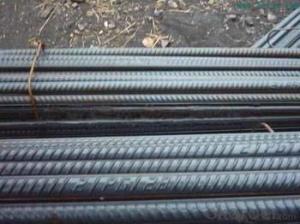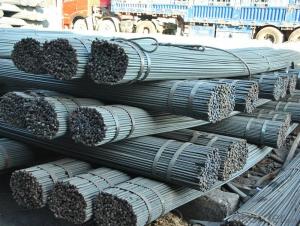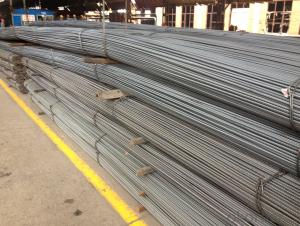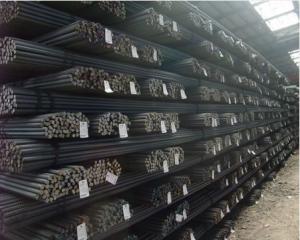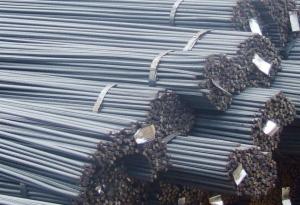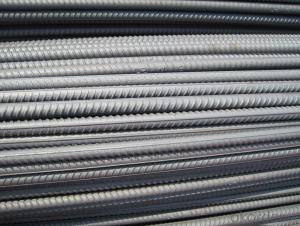Rebar steel for building construction different grade
- Loading Port:
- Tianjin
- Payment Terms:
- TT OR LC
- Min Order Qty:
- 500 m.t.
- Supply Capability:
- 17689 m.t./month
OKorder Service Pledge
OKorder Financial Service
You Might Also Like
Specification
Steel rebar is bars of steel commonly used in construction, especially for reinforcing concrete structures
such as driveways, foundations, walls, and columns.Most grades of steel used in rebar cannot accept welding;
such as, to adjacent steel plates or as means to bind single pieces of rebar together. However, special grades
of rebar steel and welding rods make welding by expert welders possible.
To prevent workers from accidentally impaling themselves, the protruding ends of steel rebar are often bent over
or covered with special plastic "mushroom" caps
Our Advantage:
High quality steel products from 1 class mills in China
Reasonable price
Professionalism of the products
On-time delivery
Complete documents and certificates
Sincere service to meet our clients' requirements
Product Description :
Chemical composition (%): | Steel | C | Si | Mn | P | S | Ceq | ||||
HRB335 |
0.25 |
0.80 |
1.60 |
0.045 |
0.045 | 0.52 | |||||
HRB400 | 0.54 | ||||||||||
HRB500 | 0.55 | ||||||||||
Mechanical properties | Steel | Rel/ MPa | Rm/ MPa | A/ % | Agt/ % | ||||||
≥ | |||||||||||
HRB335 | 335 | 455 | 17 |
7.5 | |||||||
HRB400 | 400 | 540 | 16 | ||||||||
HRB500 | 500 | 630 | 15 | ||||||||
Package: | Standard export packing or as customer's request | ||||||||||
Application: | Construction, building, bridge, road. ect | ||||||||||
Payment terms | 1).100% irrevocable L/C at sight. | ||||||||||
Delivery time | 15-30 days after receipt of L/C or deposit by T/T | ||||||||||
Features
1、Pure steel quality, stable chemical contents, small tolerance.
2、Constant Quality, good drawing performance.
3、High dimension accuracy degree, accuracy degree of Level C up to 80%, smooth surface, less scale, easy to be pickled.
4、Automatic bundling with 4 lines by Machine in tidy and good looks
5、Big high quality percentage, small coil percentage, and heavy coil weight for Hard Coil.
6、High sorbitizing percentage.
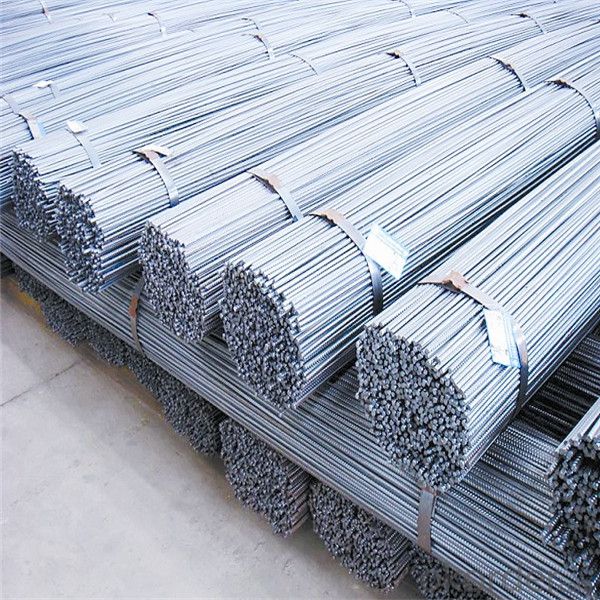
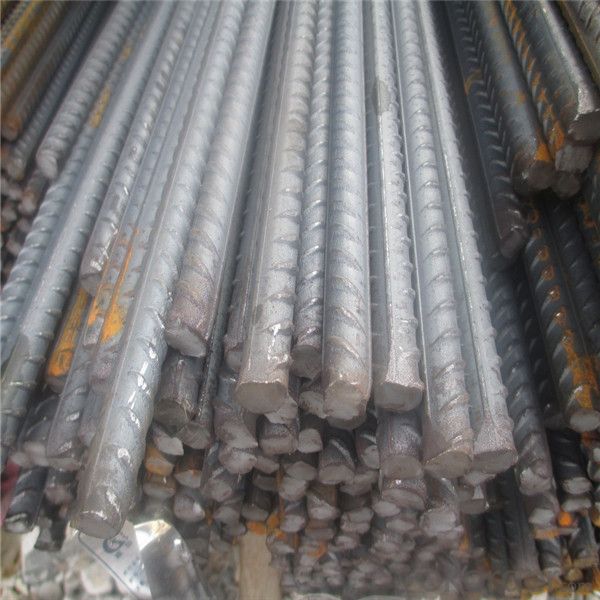
Packing:
In bundles, each bundle weight 3.5 tons. Load by container or by bulk verssel.
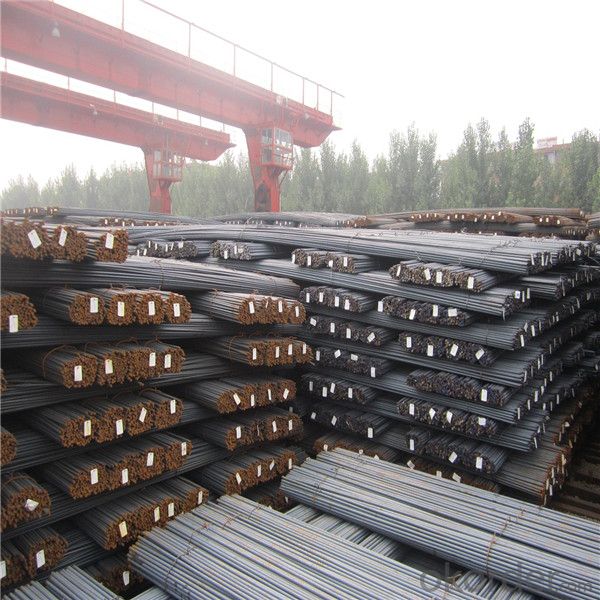

Our service
(1) We cooperate with famous factories with advanced equipment and well trained workers.
(2) We can provide factory price with trading company service.
(3) We continuously work on the improvement of our processes, guaranteeing consistently high standards
of quality to keep none compensation.
(4) We guarantee 24 hours response and 48 hours solution providing service.
(5) We accept small order quantity before formal cooperation.
(6) We deliver the agreed quality at the agreed time, reacting to changes in customer wishes in a flexible way.
(7) Due to our volume and selling power, we have excellent freight rates with shipping lines.
(8) We strive to always be fair and honest in our dealings with customers.
(9) We strive to work together with customers to achieve much more than we can achieve alone.
(10) Through our passion and commitment we aim to be a market leader in all our key markets. To maintain
our position as market leader we must continue to add value in all that we do.
FAQ:
1.Q: What's your MOQ(minimum order quantity)?
A: One full container, mixed acceptable .
2. Q: What's your packing methods?
A: Packed in bundle or bulk ..
3. Q: How can I buy CNBM products in my country?
A:Please send us an inquiry or email ,we will reply to you if there is distributor in your country
4. Q: Can we visit your factory?
A: Warmly welcome. Once we have your schedule, we will arrange the professional sales team to follow up your case.
5. Q: How long does it take to get the product if i place an order?
A:With the process of your requirements,we will pack and deliver in 3-7 days. If it is by sea shipment,it will take 15-45 days depending on different locations
- Q: How are steel rebars fixed in concrete slabs?
- Steel rebars are fixed in concrete slabs by being positioned and secured within the concrete mixture before it solidifies. The rebars are typically laid out in a predetermined pattern, and then tied together with wire or secured with metal clips to ensure they stay in place. This reinforcement helps to improve the strength and durability of the concrete slab, making it more resistant to cracking and structural failure.
- Q: How is steel rebar manufactured?
- Steel rebar, or reinforcing bar, is manufactured through a process known as steelmaking. The manufacturing process involves several steps to ensure the production of high-quality and durable rebar. The first step in manufacturing steel rebar is the selection and preparation of raw materials. Iron ore, coal, and limestone are the primary raw materials used in steelmaking. Iron ore is extracted from mines and then processed to remove impurities. Coal is used as a fuel source to heat the iron ore, while limestone acts as a flux to remove impurities during the heating process. Once the raw materials are prepared, they are combined in a blast furnace. The blast furnace is a large, cylindrical structure where the iron ore, coal, and limestone are heated to extreme temperatures. The intense heat causes a chemical reaction that separates the iron from the impurities, resulting in molten iron. The molten iron is then transferred to a basic oxygen furnace (BOF) or an electric arc furnace (EAF). In the BOF process, the molten iron is combined with scrap steel and other alloys to create the desired steel composition. Oxygen is blown into the furnace, which removes impurities and adjusts the carbon content. In the EAF process, electricity is used to melt the scrap steel and other alloys, and chemical reactions occur to adjust the composition and remove impurities. After the steel has been produced, it is poured into continuous casting machines, which shape the steel into long, rectangular strands called billets. These billets are then passed through a series of rolling mills, which gradually reduce their size and shape them into the desired cross-sectional profile. The rolling process also enhances the strength and durability of the steel. Once the rebar has been rolled, it undergoes a process called quenching and tempering. This involves rapidly cooling the rebar in water to increase its hardness, followed by reheating it to a specific temperature and then cooling it slowly. This process helps improve the rebar's strength and ductility, making it suitable for reinforcement in concrete structures. Finally, the rebar is cut into desired lengths and often undergoes surface treatment, such as galvanization or epoxy coating, to enhance its corrosion resistance. It is then bundled and shipped to construction sites, where it is used to reinforce concrete structures like buildings, bridges, and roads. In summary, the manufacturing of steel rebar involves the selection and preparation of raw materials, the melting and refining of iron in a blast furnace or electric arc furnace, the shaping of the steel into billets through continuous casting and rolling, the quenching and tempering process to improve its strength and ductility, and the final cutting and surface treatment before it is ready for use in construction projects.
- Q: What are the environmental impacts of using steel rebars in construction?
- The environmental impacts of using steel rebars in construction include the extraction and processing of raw materials, such as iron ore, which can contribute to deforestation, habitat destruction, and emissions of greenhouse gases. The production of steel also requires significant amounts of energy and water, leading to carbon dioxide emissions and potential water pollution. Additionally, the disposal of steel waste and the potential for corrosion can contribute to land and water pollution. However, steel rebars can also have positive environmental impacts, as they are durable, recyclable, and can contribute to the overall sustainability of a structure.
- Q: How do steel rebars improve the flexural strength of concrete?
- Concrete's flexural strength is enhanced by the presence of steel rebars, which reinforce the material and resist tensile forces. Although concrete is strong in compression, it lacks the same strength in tension, making it prone to cracking and failure under bending or other flexural stresses. The addition of steel rebars to the concrete results in a composite material with improved flexural strength. These rebars serve as reinforcement, absorbing and distributing tensile forces throughout the structure. When subjected to bending, the rebars counteract the tension, effectively preventing cracks from forming and spreading. Typically, the rebars are strategically placed in areas where tensile stresses are anticipated, such as the bottom of a beam or the tension face of a slab. Their purpose is to provide sufficient strength to bear the tensile forces and safeguard the concrete from failure. The bond between the rebars and the concrete is essential for ensuring effective transfer of loads from the concrete to the steel reinforcement. Furthermore, the incorporation of rebars allows for the design of slimmer and more efficient concrete elements. By providing the necessary tensile strength, the amount of concrete required can be reduced, resulting in cost savings and lighter structures. The combination of concrete and steel rebars maximizes the material properties of both components, creating a composite material that exhibits strength in both compression and tension. In summary, steel rebars significantly enhance the flexural strength of concrete by reinforcing it against tensile forces, thereby preventing cracking and failure. This reinforcement enables the design of more efficient and durable structures.
- Q: Can steel rebars be used in earthquake-resistant construction?
- Yes, steel rebars can be used in earthquake-resistant construction. Steel rebars provide strength and reinforcement to concrete structures, making them more resistant to seismic forces during an earthquake. The ductility and flexibility of steel rebars allow them to absorb and distribute the energy generated by an earthquake, reducing the risk of structural failure and enhancing the overall resilience of the building.
- Q: How do steel rebars affect the structural integrity of a building?
- Steel rebars play a crucial role in enhancing the structural integrity of a building. These reinforced steel bars are primarily used in concrete structures to provide strength and stability. By reinforcing the concrete, rebars help to resist tensile forces and prevent the formation of cracks in the building. One of the main ways rebars affect structural integrity is by increasing the overall load-bearing capacity of the structure. When concrete is combined with steel rebars, it creates a composite material that can withstand greater amounts of weight and stress. This is particularly important in high-rise buildings or structures that need to support heavy loads, such as bridges or parking garages. Moreover, rebars help mitigate the effects of shrinkage and temperature changes on the concrete. Concrete has a tendency to shrink and expand due to changes in temperature and humidity. This can cause cracks to form and compromise the structural integrity of the building. However, by embedding rebars within the concrete, these forces are counteracted, preventing significant damage. Another critical aspect of rebars is their ability to resist bending and deformation. In the event of an earthquake or other dynamic forces, the rebars help distribute the energy throughout the structure, reducing the risk of collapse. This resilience is vital in regions prone to seismic activity. Furthermore, steel rebars offer exceptional durability and longevity. Unlike other materials, such as wood or plastic, steel does not rot, decay, or get affected by termites or other pests. This ensures that the structural integrity of the building remains intact over time, reducing the need for frequent repairs or replacements. In conclusion, steel rebars significantly enhance the structural integrity of a building. By reinforcing concrete, rebars provide strength, increase load-bearing capacity, resist shrinkage and temperature changes, mitigate the effects of dynamic forces, and provide long-lasting durability. Without the inclusion of rebars, buildings would be more susceptible to cracking, structural failure, and compromised safety.
- Q: Can steel rebars be welded to other steel components?
- Yes, steel rebars can be welded to other steel components. Welding is a common method used to join steel structures, including rebars, to create strong and durable connections.
- Q: What are the different sizes of steel rebars available in the market?
- The market offers a variety of steel rebar sizes to cater to the specific needs and requirements of construction projects. Typically, steel rebars are available in a range of diameters, which commonly span from 6mm to 40mm. The designated sizes are determined by the nominal diameter of the rebar. Among the steel rebars available in the market, the most frequently utilized sizes are 6mm, 8mm, 10mm, 12mm, 16mm, 20mm, 25mm, 32mm, and 40mm. These sizes are extensively employed in various construction applications and can easily be found in most hardware stores. The selection of the rebar size is reliant on the structural design, the required load-bearing capacity, and the specific construction project. Smaller diameter rebars, such as 6mm or 8mm, are commonly employed in light construction projects or instances where a lesser load-bearing capacity is necessary. Conversely, larger diameter rebars, such as 25mm or 32mm, are often used in heavy-duty construction projects or structures that demand higher load-bearing capacity. To determine the appropriate rebar size for a particular project, it is crucial to consult with structural engineers or construction professionals. They can offer guidance based on the design requirements and structural calculations.
- Q: Can steel rebars be used in tunneling and mining operations?
- Steel rebars have a wide range of applications, including tunneling and mining operations. These steel bars, typically used for reinforcing concrete structures, can also be utilized in underground construction projects like tunnels and mines. By incorporating rebars into these environments, additional strength and stability are provided to the structures, ensuring durability and safety. In tunneling projects, it is common to embed rebars in shotcrete or concrete linings to enhance the structural integrity of the tunnel walls and prevent collapse. Similarly, in mining operations, rebars are used to reinforce the roofs, walls, and support structures within the mine, protecting against potential hazards such as rockfalls and cave-ins. The use of steel rebars is essential in maintaining the integrity and stability of these underground structures during tunneling and mining operations.
- Q: What is the average lifespan of steel rebars in concrete structures?
- The average lifespan of steel rebars in concrete structures can vary depending on various factors such as the quality of the steel, environmental conditions, and maintenance practices. However, under normal conditions, steel rebars in concrete structures are expected to have a lifespan of around 50 to 100 years.
Send your message to us
Rebar steel for building construction different grade
- Loading Port:
- Tianjin
- Payment Terms:
- TT OR LC
- Min Order Qty:
- 500 m.t.
- Supply Capability:
- 17689 m.t./month
OKorder Service Pledge
OKorder Financial Service
Similar products
Hot products
Hot Searches
Related keywords
